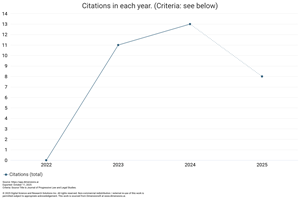The Ius Constituendum of an Equitable Dispute Resolution Mechanism for Constitutional Complaints
DOI:
https://doi.org/10.59653/jplls.v3i02.1658Keywords:
Ius Constituendum, Constitutional Complaint, Constitutional RightsAbstract
The settlement of constitutional complaint disputes represents a legal mechanism that may be undertaken by a branch of judicial power, such as the Constitutional Court (Mahkamah Konstitusi). This mechanism is intended to ensure the upholding of the law and the protection of citizens' constitutional rights. This mechanism has long been implemented in several countries—such as South Korea, Germany, and Thailand. However, in Indonesia, no legal framework currently governs constitutional complaints. The absence of such regulation has resulted in the lack of a legal mechanism for resolving cases involving violations of constitutional rights. This article examines two key aspects: first, the theory and practice of constitutional complaint dispute resolution, and second, the ius constituendum regarding constitutional complaint resolution in Indonesia. The study highlights the necessity of comprehensive regulation to ensure legal certainty and justice within the Indonesian legal system. The research adopts a normative juridical method, using statutory, case-based, conceptual, and comparative approaches.
Downloads
References
Ahmad, S. (2006). Peradilan Konstitusi, Suatu Studi tentang Adjudikasi Konstitusional Sebagai Mekanisme Penyelesaian Sengketa Normatif. Pradnya Paramita.
Asshiddiqie, J. (2012). Peradilan Mahkamah Konstitusi di Sepuluh Negara. Sinar Grafika.
Awanisa, A., Yusdianto, Y., & Khoiriah, S. (2021). The Position of Constitutional Complaint in the Constitutional Court of the Republic of Indonesia. Pancasila and Law Review, 2(1), 61–78.
Bauw, L. (2025). Decentralization and Strengthening of Districts in Papua: Analysis in the Perspective of Constitutional Law. Journal of Progressive Law and Legal Studies, 3(01 SE-Articles), 148–160. https://doi.org/10.59653/jplls.v3i01.1493
Buana, M. S. (2023). Perbandingan Hukum Tata Negara (Filsafat, Teori, Dan Praktik). Sinar Grafika.
Chakim, M. L. (2019). A Comparative Perspective on Constitutional Complaint: Discussing Models, Procedures, and Decisions. In Constitutional Review (Vol. 5, Issue 1). https://doi.org/10.31078/consrev514
Fajarwati, M., & Subroto, J. J. G. (2016). Upaya Hukum untuk Melindungi Hak Konstitusional Warga Negara Melalui Mahkamah Konstitusi (Legal Remedies to Protect Citizen’s Constitutional Rights through Constitutional Court). Jurnal Legislasi Indonesia, 13, 321–332.
Harding, A., & Leyland, P. (2011). The constitutional system of Thailand: A contextual analysis. Bloomsbury Publishing.
Karamysheva, S. (2020). Protection of Socio-Economic Rights by the Constitutional Court of the Russian Federation. Constitutional Review, 6(1). https://doi.org/10.31078/consrev611
Kim, J. (2020). Constitutional Adjudication and Democracy in the Republic of Korea: A Quest for a Republican Reformulation of Constitutional Democracy. Yonsei LJ, 11, 103.
Kommers, D. P., & Miller, R. A. (2012). The Constitutional Jurisprudence of the Federal Republic of Germany: Revised and Expanded. Duke University Press.
Lailam, T. (2022). Peran Mahkamah Konstitusi Federal Jerman Dalam Perlindungan Hak Fundamental Warga Negara Berdasarkan Kewenangan Pengaduan Konstitusional (The Role of The German Federal Constitutional Court In Protecting of Fundamental Rights Based on the Constitutional C. Jurnal HAM, 13(1), 65–80.
Lailam, T., Anggia, P., & Irwansyah. (2022). The Proposal of Constitutional Complaint for the Indonesian Constitutional Court Proposal Pengaduan Konstitusional untuk Mahkamah Konstitusi Indonesia. Jurnal Konstitusi, 19(3), 693–719.
Lubis, A. F. (2025). Harmonization of Derivative Legislative Products Post-Constitutional Court Decision. Journal of Progressive Law and Legal Studies, 3(01 SE-Articles), 32–40. https://doi.org/10.59653/jplls.v3i01.1310
MD, M. M. (2010a). Constitutional Question, Alternatif Baru Pencarian Keadilan Konstitusional. UB Press.
MD, M. M. (2010b). Konstitusi dan Hukum dalam Kontroversi Isu. RajaGrafindo Persada, Jakarta.
Negara, T. A. S. (2023). Normative legal research in Indonesia: Its originis and approaches. Audito Comparative Law Journal (ACLJ), 4(1), 1–9.
Online, H. (2008). Menggagas Constitutional Complaint Lewat Kasus Ahmadiyah. Https://Www.Hukumonline.Com/.
Sakinah, A. F., & Wijayanti, S. N. (2024). Urgensi Kewenangan Constitutional Complaint dalam Penguatan Hak-Hak Konstitusional. Media of Law and Sharia, 6(1), 32–51.
Stojadinovic, S. (2019). Political Influence on the Constitutional Court in the Republic of Macedonia: Reflections through the Dissenting Opinions in the Period of 2012-2015. In Constitutional Review (Vol. 5, Issue 1). https://doi.org/10.31078/consrev513
Subiyanto, A. E. (2011). Perlindungan Hak Konstitusional Melalui Pengaduan Konstitusional. Jurnal Konstitusi, 8(5), 707–732.
Sujono, I. (2022). Urgensi Penemuan Hukum dan Penggunaan Yurisprudensi dalam Kewenangan Mahkamah Konstitusi. Jurnal Konstitusi, 18(3), 585. https://doi.org/10.31078/jk1835
Thalib, A. R. (2006). Wewenang Mahkamah Konstitusi dan Implikasinya dalam Sistem Ketatanegaraan Republik Indonesia. PT. Citra Aditya Bakti.
Wanta, V. C. C., & Pondaag, A. H. (2023). PERLUASAN KEWENANGAN MAHKAMAH KONSTITUSI REPUBLIK INDONESIA TERHADAP PENGADUAN KONSTITUSIONAL SEBAGAI PERLINDUNGAN HAK KONSTITUSIONAL WARGA NEGARA. LEX PRIVATUM, 11(4).
Wiryanto. (2019). Mahkamah Konstitusi dalam Sistem Ketatanegaraan RI (Bimbingan Teknis Hukum Acara Penyelesaian Perselisihan Hasil Pemilihan Umum Tahun 2019).
Zoelva, H. (2010). Constitutional Complaint Jalan Terakhir Mencari Keadilan (Pemaparan Materi Saat Menerima Kunjungan Mahasiswa Fakultas Hukum Universitas Sriwijaya).
Downloads
Published
How to Cite
Issue
Section
License
Copyright (c) 2025 Kristian, M. Hadin Mujhad, Suriansyah Murhaini, Mirza Satria Buana

This work is licensed under a Creative Commons Attribution-ShareAlike 4.0 International License.
Authors who publish with this journal agree to the following terms:
- Authors retain copyright and grant the journal right of first publication with the work simultaneously licensed under a Creative Commons Attribution-ShareAlike that allows others to share the work with an acknowledgement of the work's authorship and initial publication in this journal.
- Authors are able to enter into separate, additional contractual arrangements for the non-exclusive distribution of the journal's published version of the work (e.g., post it to an institutional repository or publish it in a book), with an acknowledgement of its initial publication in this journal.
- Authors are permitted and encouraged to post their work online (e.g., in institutional repositories or on their website) prior to and during the submission process, as it can lead to productive exchanges, as well as earlier and greater citation of published work (See The Effect of Open Access).
























